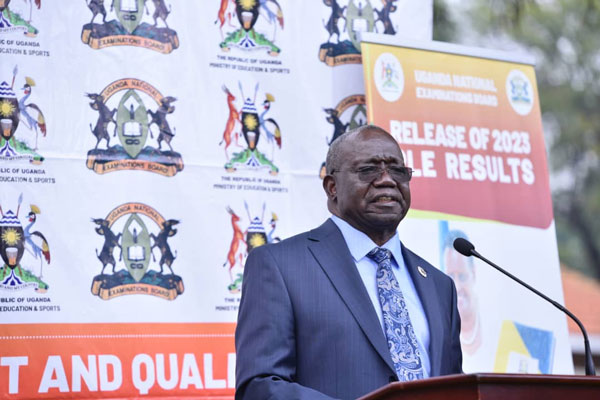
Kampala, Uganda | THE INDEPENDENT | The Uganda National Examinations Board (UNEB) has revealed that under the new lower secondary school curriculum, scores for student’s projects will be reported separtely on Uganda Certificate of Education (UCE) certificates.
Dan Odongo, the UNEB Executive Director, confirmed the development while addressing the press about this year’s examination cycle, noting that this is one of the new initiatives that will enhance the evaluation and recognition of students’ skills and accomplishments.
“Scores for projects will be reported separately on the certificates. Any candidates without a project score will not be graded by UNEB,” he noted.
Available information indicates that the learner’s project achievement for one of the projects done in Senior Three and Four will be submitted by the school to UNEB.
Jennifer Kalule, the UNEB spokesperson, noted that the board has provided schools with a project observation checklist to guide the assessment submissions.
“After receiving the submissions, the board will review them to ensure they meet the required standards and are not falsified. We have already developed mechanisms to address this,” she stated.
From the time of its rollout, the new lower secondary curriculum introduced new components including school-based assessment and a practical aspect. The school-based assessment, when compiled, will account for 20 percent of the final mark obtained by the candidate while the practical aspect requires each learner to produce something tangible.
Earlier documents from the National Curriculum Centre indicated that the assessment of the practical component, now referred to as a project, would be handled by the Directorate of Industrial Training.
Parents were informed that in Senior Three, a learner’s skill or project would be assessed and awarded a Level One Competency Certificate from the Uganda Vocational Qualification Framework (UVQF). This meant that on completion of the education level, a learner would get out with two certificates; the said UVQF certificate and the Uganda Certificate of Education.
However, last year, as schools prepared to register for the Directorate of Industrial Training (DIT) assessment, a new interpretation emerged. The Ministry of Education removed DIT from the assessment process within the lower secondary setting, transferring the responsibility for skills and project assessment to the Uganda National Examinations Board (UNEB).
In an earlier interview, Maliko Ssemusu, a teacher in Wakiso, noted that since this change, teachers have been uncertain about how the project assessment and reporting would be handled. With the recent announcement from UNEB, Ssemusu’s concerns have been addressed.
Aside from projects, schools will also have to submit learners’ subject achievements. These are based on the continuous assessment observation checklist developed by the UNEB.
The new lower secondary curriculum introduced the component of continuous assessment, which ideally requires schools to compile learners’ class-based assessments starting from Senior One, Term One.
However, when the curriculum was rolled out, mechanisms for handling this were not yet in place, and teachers needed to be trained on how to implement it.
Kalule notes that for the pioneering examination, schools have been required to submit learners’ subject achievement scores for only one term. “They will be sending in scores for Term Two, which is going to start next week,” she explained.
The board will also require scores for the Activity of Integration for five terms: Terms 1, 2, and 3 of Senior Three, and Terms 1 and 2 of Senior Four. The Activity of Integration is a class-based assessment conducted at the end of each chapter that a teacher has taught.
“Submission to be done electronically via the UNEB portal from June 4 to October 4, 2024. any teacher who admits a learner from another school should ensure that he/she obtains coursework assessment records. Any learner without them shall not be graded,” warned Odongo.
However, he added that there will be an option for late submission, with a window set between October 5 and October 15, but this will attract an extra charge.
“UNEB shall not receive continuous assessment scores after October 15,” he noted, further emphasizing g that the board shall not be held accountable for assessments not submitted on time.
The director added that the board is currently training all teachers of secondary schools in different regions of the country on competence-based and continuous assessment skills, as well as data collection using the assessment management information system.
Critics have pointed out that the training on assessment has been delayed, and many teachers still do not know what to do, yet they must submit scores to the board. There is concern that the marks submitted might be inaccurate or problematic, potentially impacting the quality of the outcomes.
Meanwhile, the registration of candidates this year will close on May 31. UNEB will administer four national papers, including the Primary Leaving Examination (PLE) and Uganda Certificate of Education (UCE) under both the new lower secondary curriculum and the old curriculum, as well as the Uganda Advanced Certificate of Education (UACE) exam.
*****
URN
 The Independent Uganda: You get the Truth we Pay the Price
The Independent Uganda: You get the Truth we Pay the Price



What’s behind these questions and I beg mercy when you’re marking my paper